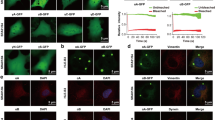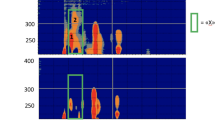Abstract
WHEN lenses of young rats are cooled below 10° C they become reversibly opaque due to the precipitation of a cold-precipitable protein. This fraction is prepared by homogenizing rat lenses in several volumes of water and cooling the 105,000g supernatant to 0° C. Repeated solubilization at 20° C and precipitation at 0° C serves as a means of purification1. The cold-precipitation phenomenon is thought to be caused by changes in protein conformation due to a disturbance of the balance between hydrogen and hydrophobic bonding of protein chains at lower temperatures.
This is a preview of subscription content, access via your institution
Access options
Subscribe to this journal
Receive 51 print issues and online access
$199.00 per year
only $3.90 per issue
Buy this article
- Purchase on Springer Link
- Instant access to full article PDF
Prices may be subject to local taxes which are calculated during checkout
Similar content being viewed by others
References
Zigman, S., and Lerman, S., Nature, 203, 662 (1964).
Zigman, S., and Lerman, S., Exp. Eye Res., 4 (1964).
Zigman, S., Munro, J., and Lerman, S., Biol. Bull., 127 (1964).
Bjork, I., Exp. Eye Res., 1, 145 (1961).
Author information
Authors and Affiliations
Rights and permissions
About this article
Cite this article
ZIGMAN, S., MUNRO, J. & LERMAN, S. Effect of Urea on the Cold Precipitation of Protein in the Lens of the Dogfish. Nature 207, 414–415 (1965). https://doi.org/10.1038/207414b0
Issue Date:
DOI: https://doi.org/10.1038/207414b0
This article is cited by
-
Validation of a Method Based on Liquid Chromatography-Tandem Mass Spectrometry for Multiclass Screening and Analysis of 59 Veterinary Drugs in Fishery Foods
Food Analytical Methods (2024)
-
Myosin light chain of shark fast skeletal muscle exhibits intrinsic urea-resistibility
Scientific Reports (2023)
-
Proliferation of shark leukocytes
In Vitro Cellular & Developmental Biology - Animal (1992)
-
Urea-requiring lactate dehydrogenases of marine elasmobranch fishes
Journal of Comparative Physiology B (1978)
Comments
By submitting a comment you agree to abide by our Terms and Community Guidelines. If you find something abusive or that does not comply with our terms or guidelines please flag it as inappropriate.



